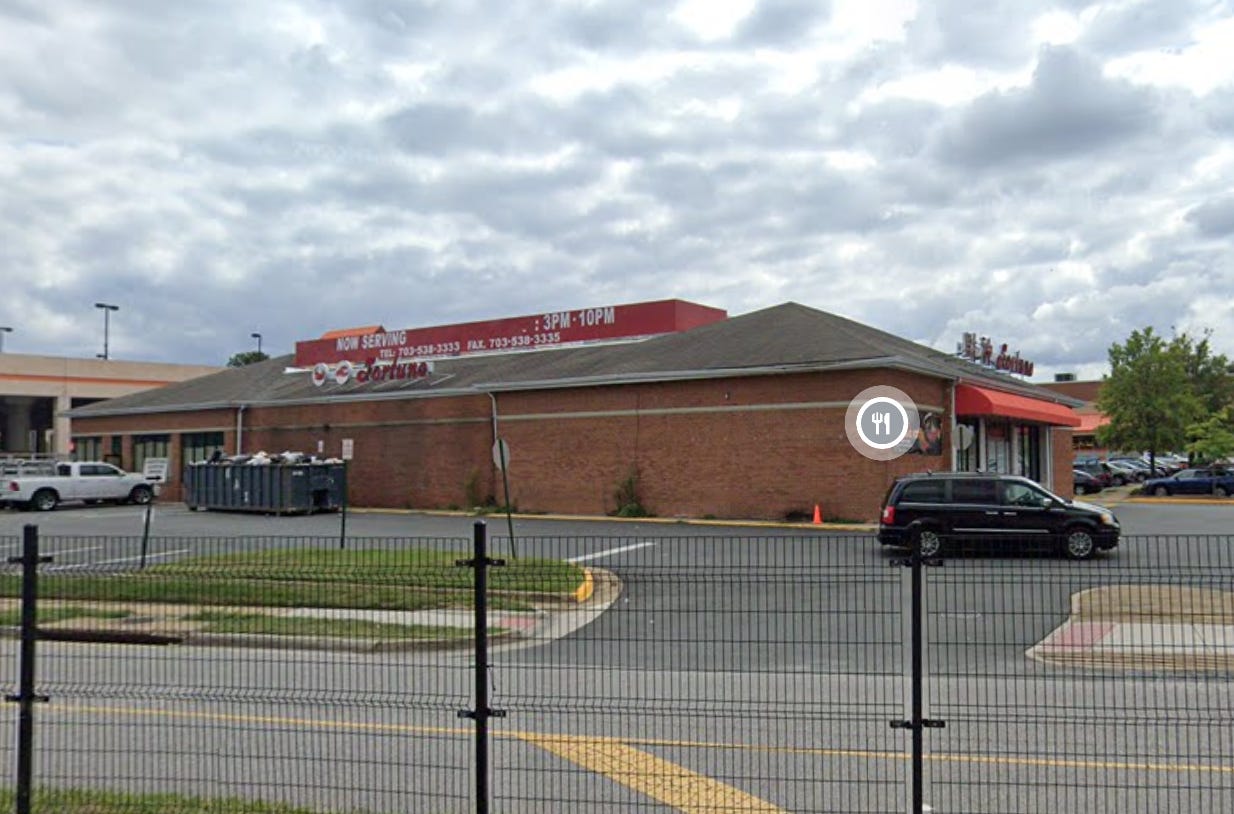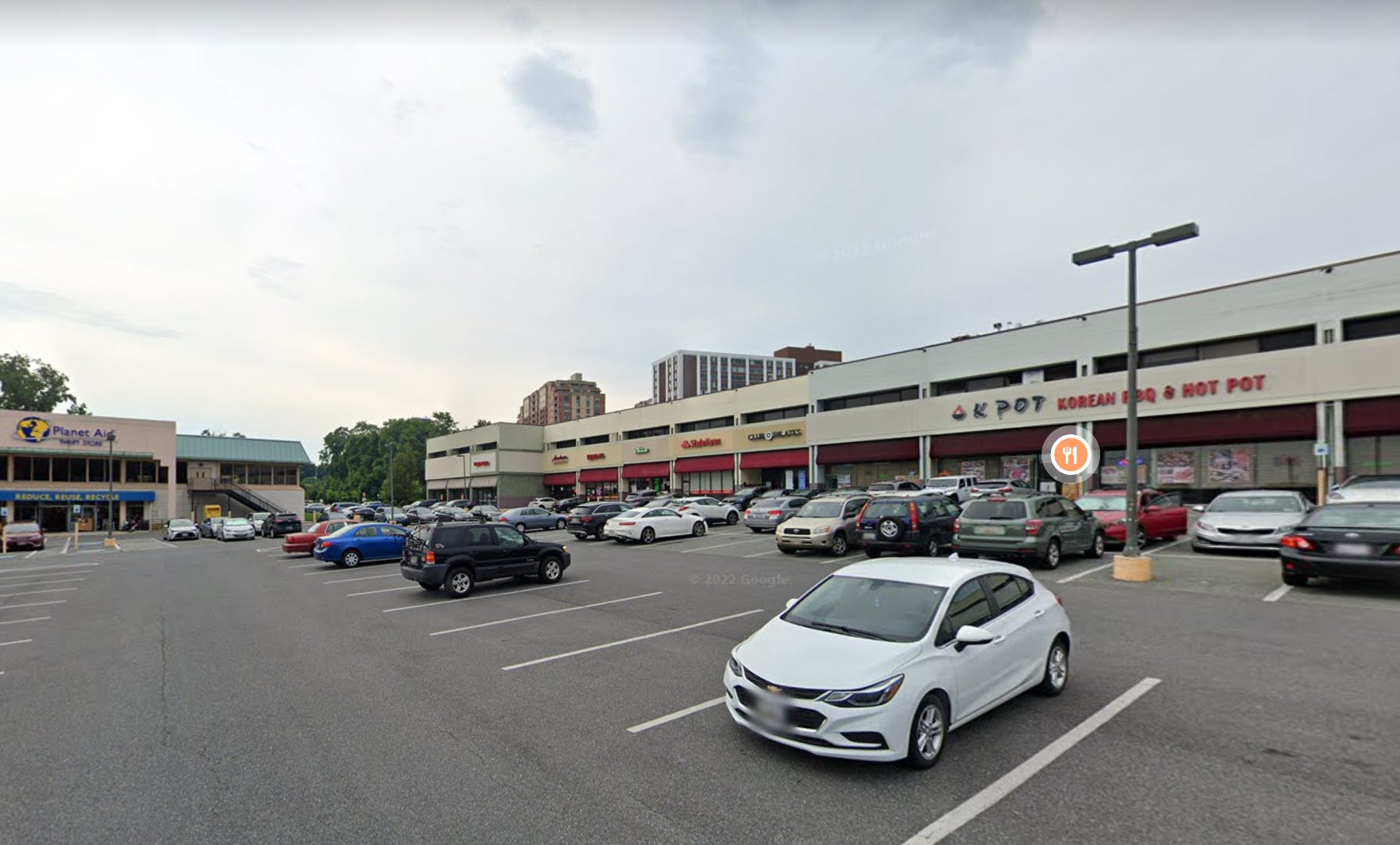The Deleted Scenes - What If You're the Placeless One?
A new hotpot/Korean barbecue restaurant recently announced its opening in Herndon, a small town in Fairfax County near my home. I was trying to find the announcement the other day, which I had seen on Facebook, but I couldn’t. My wife thought it might have been called K-Pot, so I looked up that name. That wasn’t it, but that was the name of a local chain I guess we sort-of remembered, which also served hotpot and Korean barbecue. So when I searched “K-Pot Herndon,” I got the actual K-Pot in an area known as Seven Corners, about 30 minutes away. “Huh, I know that building,” I said. Here it is, under a previous tenant. It’s interesting; it looks like it used to be something. Then my wife said she thought this new place had a location in or near Rockville, Maryland, so I searched “hotpot Rockville.” There are a few hotpot restaurants there, but the one she was thinking of was another K-Pot. “I know that building too!” I said. (The new place in Herndon is called H-Pot.) Here it is: one of these interesting double-decker strip plazas you see in more densely populated suburbs. I had just recently passed both of these buildings while out on little road trips (this one and this one). I thought this was kind of cool. Once in awhile I’m reminded that years of exploring these everyday landscapes in the D.C. suburbs have given me a sense of familiarity and a sense of place. It feels granular to me; it’s like putting on sharper and sharper pairs of glasses, seeing the endless suburban sprawl sharpen into lots of specifics. I wrote about this in regard to identifying plants, reflecting on a recent nature walk. The same applies to buildings and places and businesses.
And I had a similar thought back last year when I gave a friend from Maryland a little tour of Virginia’s D.C. suburbs, and I realized I was now able to give the history of a whole bunch of buildings and places we passed:
(Well, some people do. Thanks for reading!) It’s often said that the D.C. area, and particularly Northern Virginia, is “placeless” or “rootless” or, especially, “transient.” That nobody really stays or wants to stay; that there’s no real culture here, no identity which new residents will eventually adopt. I frequently hear this from conservatives, but I gather it’s a pretty widely held view. It’s not made up out of nothing; it’s largely based on the fact that a lot of military, intelligence, defense, and appointed government staff come in and out constantly. And it is placeless, I suppose, in the way that most of American suburbia is, although I think there’s much more than meets the eye in these suburban landscapes. But I disagree, really, with that whole characterization. Maybe I’m easily won over, but recognizing those two slightly interesting restaurant buildings, from months, really years, of traversing these suburban communities, I felt a sense of place. A place is transient if you are transient; a place is rootless if you don’t put down roots. It’s easy to mistake our own perception of or approach to a place as something inherent in the place itself. It’s a rewarding and curious feeling to know a place so well that bits and pieces of it become landmarks. You populate it with your own memories and experiences, and that’s enough to enliven it. If you haven’t lived somewhere long enough to stop using GPS, I don’t think you can pronounce judgment on its worthiness as a “real place.” I wonder how many people churn through the D.C. suburbs, leaving after a couple of years because, well, you leave after a couple of years. Thinking their detachment from the place is the place’s detachment from them. I sometimes write that I’m thankful or grateful to have discovered urbanism, broadly defined. I know others who have this same feeling. What I mean by that is that I think a lot of really deeply human ways of doing things have been lost, and that it’s easy to not really encounter them in daily life, and that urbanism is a way to remember them, encounter them, and once again make them present. When I say “urbanism,” I mean much more than land use; I really mean creativity, granularity, enterprise, entrepreneurship, human activity at a small scale. Letting people strike out and give something a go. The commerce, society, and land use of a traditional city all arise out of that freedom. In a different form, we see a lot of that in suburbs today. Frankly, much of Washington, D.C. feels less “urbanist,” in my vague meaning, than much of the D.C. suburbs. A place is a place you can call home and be at home. And here, I do. Related Reading: In Praise of Northern Virginia Thank you for reading! Please consider upgrading to a paid subscription to help support this newsletter. You’ll get a weekly subscribers-only post, plus full access to the archive: over 600 posts and growing. And you’ll help ensure more material like this! You're currently a free subscriber to The Deleted Scenes. For the full experience, upgrade your subscription. |
Older messages
Old Wisdom, New Movement
Saturday, April 22, 2023
YIMBYs are forced to turn an ur-issue into a political movement
New and Old #106
Friday, April 21, 2023
Friday roundup and commentary
Being a Part of It
Thursday, April 20, 2023
Small business draws you into a place
Not Quite on Target
Wednesday, April 19, 2023
The downside of "mixed-use development" urbanism
Grill of My Dreams
Wednesday, April 19, 2023
My suburban life is complete, plus very long thoughts on urbanism and culture war
You Might Also Like
*This* Is How To Wear Skinny Jeans Like A Fashion Girl In 2025
Wednesday, March 12, 2025
The revival is here. The Zoe Report Daily The Zoe Report 3.11.2025 This Is How To Wear Skinny Jeans Like A Fashion Girl In 2025 (Style) This Is How To Wear Skinny Jeans Like A Fashion Girl In 2025 The
The Best Thing: March 11, 2025
Tuesday, March 11, 2025
The Best Thing is our weekly discussion thread where we share the one thing that we read, listened to, watched, did, or otherwise enjoyed recent… ͏ ͏ ͏ ͏ ͏ ͏ ͏ ͏ ͏ ͏ ͏ ͏ ͏ ͏ ͏ ͏ ͏ ͏ ͏ ͏ ͏ ͏ ͏ ͏ ͏ ͏ ͏ ͏
The Most Groundbreaking Beauty Products Of 2025 Are...
Tuesday, March 11, 2025
Brands are prioritizing innovation more than ever. The Zoe Report Beauty The Zoe Report 3.11.2025 (Beauty) The 2025 TZR Beauty Groundbreakers Awards (Your New Holy Grail Or Two) The 2025 TZR Beauty
Change Up #Legday With One of These Squat Variations
Tuesday, March 11, 2025
View in Browser Men's Health SHOP MVP EXCLUSIVES SUBSCRIBE Change Up #Legday With One of These Squat Variations Change Up #Legday With One of These Squat Variations The lower body staple is one of
Kylie Jenner Wore The Spiciest Plunging Crop Top While Kissing Timothée Chalamet
Tuesday, March 11, 2025
Plus, Amanda Seyfried opens up about her busy year, your daily horoscope, and more. Mar. 11, 2025 Bustle Daily Amanda Seyfried at the Tory Burch Fall RTW 2025 fashion show as part of New York Fashion
Paris Fashion Week Is Getting Interesting Again
Tuesday, March 11, 2025
Today in style, self, culture, and power. The Cut March 11, 2025 PARIS FASHION WEEK Fashion Is Getting Interesting Again Designs at Paris Fashion Week once again reflect the times with new aesthetics,
Your dinner table deserves to be lazier
Tuesday, March 11, 2025
NY delis are serving 'Bird Flu Bailout' sandwiches.
Sophie Thatcher Lets In The Light
Tuesday, March 11, 2025
Plus: Chet Hanks reaches new heights on Netflix's 'Running Point.' • Mar. 11, 2025 Up Next Your complete guide to industry-shaping entertainment news, exclusive interviews with A-list
Mastering Circumstance
Tuesday, March 11, 2025
“If a man does not master his circumstances then he is bound to be mastered by them.” ͏ ͏ ͏ ͏ ͏ ͏ ͏ ͏ ͏ ͏ ͏ ͏ ͏ ͏ ͏ ͏ ͏ ͏ ͏ ͏ ͏ ͏ ͏ ͏ ͏ ͏ ͏ ͏ ͏ ͏ ͏ ͏ ͏ ͏ ͏ ͏ ͏ ͏ ͏ ͏ ͏ ͏ ͏ ͏ ͏ ͏ ͏ ͏ ͏ ͏ ͏ ͏ ͏ ͏ ͏ ͏ ͏ ͏
Don't Fall for This Parking Fee Scam Text 🚨
Tuesday, March 11, 2025
How I Use the 'One in, One Out' Method for My Finances. You're not facing any fines. Not displaying correctly? View this newsletter online. TODAY'S FEATURED STORY Don't Fall for the

